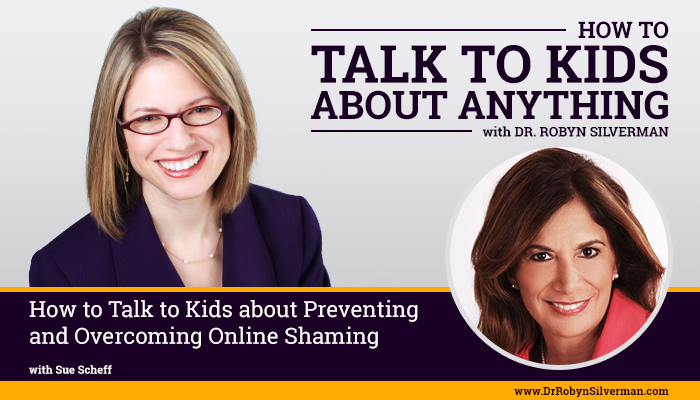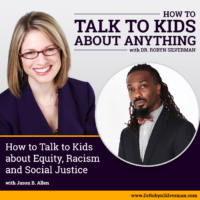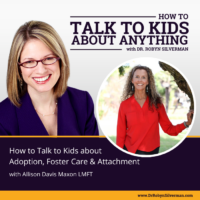Podcast: Play in new window | Download
Subscribe: Apple Podcasts | RSS | More
How to Talk to Kids about preventing and overcoming online shaming
This podcast is a response to the online shaming, abuse and bullying people often receive in this digital world. It provides tips and scripts for preventing, surviving and overcoming online shaming. Sue Scheff, author of ShameNation, speaks from personal experience but also provides many examples and stories illustrating the need to talk to kids about responsible online behavior as well as what to do if they experience an attack on their character online. Our guest advises; “We must learn patience. Never post in haste. Don’t put a temporary emotion on the permanent internet.”
Special Guest: Sue Scheff
Sue Scheff is a Nationally Recognized Author, Parent Advocate and Family Internet Safety Advocate. She founded Parents Universal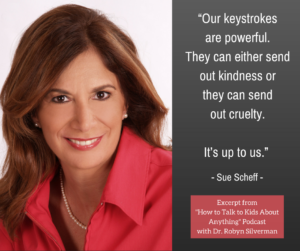 Resources Experts, Inc. She is a contributor for Psychology Today, Huffington Post, Family Online Safety and many others. She has been featured on ABC 20/20, CNN, Fox News, Anderson Cooper, Nightly News with Katie Couric, The Rachael Ray Show, Dr. Phil, and many more. Scheff has also been in USA Today, LA Times, NY Times, Washington Post, Wall Street Journal, AARP, Miami Herald just to name a few. You can catch more on her awesome new book Shame Nation at www.shamenationbook.com
Resources Experts, Inc. She is a contributor for Psychology Today, Huffington Post, Family Online Safety and many others. She has been featured on ABC 20/20, CNN, Fox News, Anderson Cooper, Nightly News with Katie Couric, The Rachael Ray Show, Dr. Phil, and many more. Scheff has also been in USA Today, LA Times, NY Times, Washington Post, Wall Street Journal, AARP, Miami Herald just to name a few. You can catch more on her awesome new book Shame Nation at www.shamenationbook.com
In today’s digitally driven world, disaster is only a click away. This is the written on the front flap of my next guest’s new book, Shame Nation. On this podcast, we’ve talked about the good and bad of the digital world- it can be a place of immense resource and positive education- we had a great discussion about learning and leading in a digital world with Eric Sheninger- and it can also be a home of aggression, misuse and the ugliness of humanity- from talking about bullying with Carrie Goldman and dignity and social aggression with Rosalind Wiseman. We have a few coming up like Katie Hurley talking about No More Mean Girls and a few others so, as parents, we know about the need for parental controls and the need for safety discussions regarding predators and who is friending you on social media. But my next guest brings to light a whole other segment of discussion that happens every day on the internet and can be like a runaway train if you don’t catch it before it gets out of control- online shaming.
The podcast provides:
- Tips on How to prevent online shaming. Sue provides guidelines to adhere to when posting online. Such as being mindful
of what you post, learn patience, de-clutter your friends list! - Tips once online shaming or cyber bullying has occurred.
- Steps to triumph in the area of online shaming.
- How to build up and humanize your online persona.
- How to check-in with yourself- am I representing myself in the way that is genuine and kind?
Important Messages:
- Employers are looking at your online presence even before they meet you. Colleges are looking at your online presence before
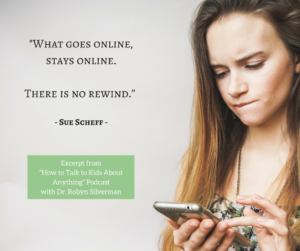 they will consider you for admission. And 54% of companies have employed a 3rd party to monitor their employees online behavior! It’s not just your content- it’s your behavior. Your online presence speaks for you!
they will consider you for admission. And 54% of companies have employed a 3rd party to monitor their employees online behavior! It’s not just your content- it’s your behavior. Your online presence speaks for you! - Your online presence is a reflection of the college or the company brand- so if your online behavior is not consistent with their brand, you will not get the scholarship, the job or the spot on the roster.
- Don’t post in haste. Pause before you post and check in with yourself. Is this a temporary emotion? Don’t put it on the permanent internet! There is no rewind!
- Don’t assume you are among friends online! A cyber acquaintance could take something from your page and lift it & post it somewhere else.
- Likes are considered endorsements. Don’t “like” it if you don’t agree with it!
- People don’t take the time today to determine what is internet fact and what is internet fiction—so make sure what YOU post is true and a representation of who you are and how you want to be perceived.
- Make sure the kids in your life know- Don’t keep online shaming to yourself! Tell someone. You are not alone!
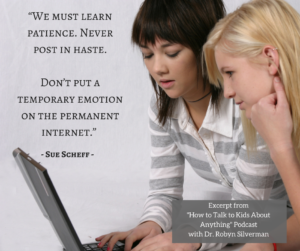 It used to be “stop, block tell.” Sue and I talked on this podcast about the importance of documenting and using a screenshot of online shaming before blocking. So now “stop, block, tell” should be changed to “stop, doc, block and tell!”
It used to be “stop, block tell.” Sue and I talked on this podcast about the importance of documenting and using a screenshot of online shaming before blocking. So now “stop, block, tell” should be changed to “stop, doc, block and tell!”- Use the code of conduct to report to the platform so that the platform will remove the comment.
- Social platforms are more active now in removing harassers.
- Mental health can be compromised when online shaming occurs.
- Build UP your online reputation. How can you showcase yourself to colleges and employers?
- Your online persona should humanize you. The positive information will balance out negative online shaming. Build your platform early.
- Our kids are watching and listening. We set the example.
Notable Quotables:
- “We have 92% of Americans armed with smart phones as if it’s a weapon. Nobody today is afforded the luxury of having an “oops” moment without risking it going viral. And once it goes viral, you become internet infamous. It scars you with
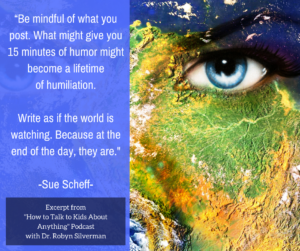 embarrassment. You are humiliated. You’re a click away from digital disgrace.”
embarrassment. You are humiliated. You’re a click away from digital disgrace.” - “You know that old cliche, ‘you don’t get a second chance to make a first impression?’ Your first impression today is, no doubt, going to be your online presence.”
- “Today, your online behavior is just as important as your offline behavior.”
- “Be mindful of what you post. What might give you 15 minutes of humor might become a lifetime of humiliation. Write as if the world is watching. Because at the end of the day, they are.”
- “What goes online, stays online. There is no rewind.”
- “Everyone is so quick to post. We must learn patience. Never post in haste. Don’t put a temporary emotion on the permanent internet.”
- “What some consider clever, others consider cruel.”
- “Be kind. When in doubt, always click out.”
- “Every move you make on the internet is your way of saying, ‘this is my character. It is a reflection of who you are offline. *
- “Make sure you represent yourself as an upstander online. Don’t endorse, perpetuate or forward hate.”
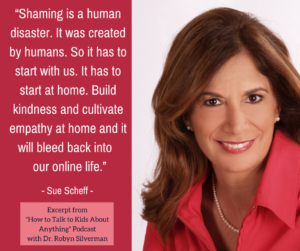 “Shaming does not define you.”
“Shaming does not define you.”- “We need to teach teens how to build up their reputation and become an influencer. They need to learn how to showcase themselves online to colleges and employers- it’s not about showing off but about showcasing. What do they have to offer?”
- “We need to check in with ourselves. How are we portraying ourselves online? Kids are watching us…They are listening. What you are saying goes in their ears and out on their screens.”
- “Shaming is a human disaster. It was created by humans. So it has to start with us. It has to start at home. Build kindness and cultivate empathy at home and it will bleed back into our online life.”
- “Our keystrokes are powerful. They can either send out kindness or they can send out cruelty. It’s up to us.”
Resources:
- www.SueScheff.com
- www.ShameNationBook.com
- www.HelpYourTeens.com
- Monica Lewinsky’s Ted Talk: https://www.ted.com/talks/monica_lewinsky_the_price_of_shame

